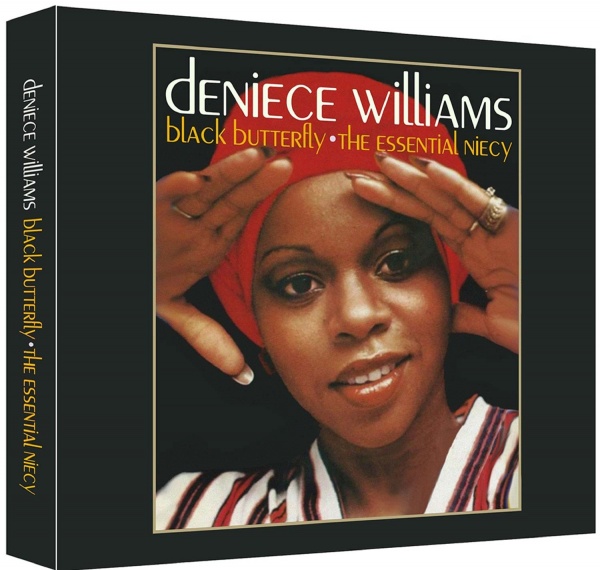
 (4 / 5)
(4 / 5)
The first ever 2CD complete career retrospective of soul diva Deniece Williams, which includes all of her chart hit singles from 1976-1989. Newly re-mastered with rare single mixes and presented in a deluxe digipak complete with a 24-page booklet and detailed liner notes
She’s as much about Gospel, Disco and pop as she is about soul. This 35 track set offers a great menu of Deniece’s delights in all those genres.
One of the most popular soul artists of the seventies and eighties. Black Butterfly features all 27 of her Billboard R&B hit singles and classic album tracks. As well as an interview with the lady herself, the album includes a foreword written by her occasional duet partner, the legendary Johnny Mathis.
She was born in Gary, Indiana and after a few singles on Chicago labels, she became Stevie Wonder’s backing singer and a member of Wonderlove. After a performance in 1976, Earth, Wind & Fire’s Maurice White offered Deniece a contract as a songwriter for Kalimba Productions and convinced her to re-launch her own recording career.
Her Columbia debut album, “This Is Niecy,” was produced by White and Charles Stepney. The first single was a huge success, “Free,” penned by Williams and Susaye Greene (I bet you are humming that one now. I am!) reached number two R&B, #25 Pop and topped the UK singles chart in 1977.
“That’s What Friends Are For,” another killer cut, followed it into the UK top ten at number eight. Her next album, “Song Bird,” was produced by White after the death of Stepney. It spun off the hit “Baby, Baby My Love’s All For You,” (R&B #13/UK #32) and the gospel-toned “God Is Amazing,” which began Williams’ continuing career as an Inspirational artist.
In 1978, Deniece paired up with Johnny Mathis for the massive international hit “Too Much, Too Little, Too Late,” (R&B number one/Pop number one/ UK number three) as well as a duet album with him.
The following year brought her a chart topping Disco hit with “I’ve Got the Next Dance,” (R&B #26/Pop #73), and she scored hits in the early eighties with “What Two Can Do,” (R&B #17), “Silly” (R&B #11/Pop #53) and “It’s Gonna Take A Miracle” (R&B #1/Pop #10), all produced by Thom Bell and Deniece. As well as the George Duke produced “Do What You Feel” (R&B number nine.
Her duet with Mathis on “Without Us,” became the theme of popular sitcom “Family Ties” starring Michael J. Fox. Williams was asked to perform a song for the “Footloose” soundtrack in 1984. The movie starring Kevin Bacon became a box-office smash, as did the soundtrack album.
The Duke-produced “Let’s Hear It For The Boy,” (R&B number one/Pop number one /UK number two) became the biggest pop hit of her career. She continued recording for Columbia until 1988, rounding out the decade with another couple of big hits; the Steve Levine produced “Never Say Never,” (R&B number six) and “I Can’t Wait” (R&B number eight/Pop #66) which saw her working with the late and great George Duke again.
An artist who deserves her place in pop and soul and R&B and gospel history, and utter respect for her talents and achievements. She oozes class, no matter what the style of stuff she is singing and how credible the song writing is.
By Simon Redley
 (1 / 5) ‘Dull Zone’
(1 / 5) ‘Dull Zone’ (2 / 5) ‘OK Zone’
(2 / 5) ‘OK Zone’ (3 / 5) ‘Decent Zone’
(3 / 5) ‘Decent Zone’ (4 / 5) ‘Super Zone’
(4 / 5) ‘Super Zone’ (5 / 5) ‘Awesome Zone’
(5 / 5) ‘Awesome Zone’





